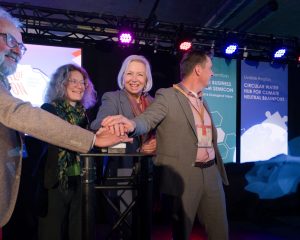Making Meaning project with Design Forum
In a pilot with Design Forum, the Eindhoven Engine Academy offered a ‘Making Meaning’ workshop to five of its running projects. Experienced designers, under the coordination of Jos Hardeman, have worked with the teams and their broader community towards a clearer understanding of the meaning and possible contributions of the project. The ultimate purpose is to assist the projects in developing an approach for meaningful communication about their project. The outcome is based on an outside-in analysis of how users and stakeholders see the project.
Elements of design thinking
What better than to first apply this approach to the Eindhoven Engine itself? Obviously, the approach is based on elements of design thinking, but it is not a full design thinking cycle. During a kick-off meeting with the core team, the procedure is explained and the few first ideas are exchanged. Next, the broader project team (in this case, the broader Eindhoven Engine team) can give input on their views in response to a questionnaire. Workshops are carried out with the wider project community, in which the team of designers use creative methods and aim to crystalize the essentials of the project from the viewpoint of its stakeholders. The designers analyze all of this and bring it together in a project canvas. The latter is validated in a meeting with the project team and its direct stakeholders. Eventually, a poster is created for communication purposes.
‘In fact, the Engine has a role to play in the transformation towards the co-creation paradigm of innovation.’
Lifelong learning platform
What was the outside world suggesting that Eindhoven Engine do? Other than the target groups we already have, it was suggested that we open the doors to intrapreneurs and employees interested in a sabbatical period and that we support companies and people who are having major challenges with transformation. By adding this focus, the Eindhoven Engine could become a lifelong learning platform.
Purpose-driven
The Engine is purpose-driven and accelerates the transformation from research towards application. In fact, the Engine supports application/client-driven innovations. It is important to open the projects up in order to integrate the full chain or, perhaps better, the broader network of stakeholders. Ideally, projects should include end-users, business development and students and maybe also politicians and/or the general public. This should create more flexible participation in innovation for all interested parties.
The Eindhoven Engine assists in and empowers the transformation from the power paradigm to the co-creation paradigm (Jansen and Pieters, 2017) or from the procedure-driven innovation approach to values-based innovation (Baets, 2020). This implies a stronger focus on rapid prototyping and a very close link with the researchers and companies.
In fact, the Engine has a role to play in the transformation towards the co-creation paradigm of innovation. It bridges co-creation, co-location, activation of collective intelligence, open innovation and disruption. In doing so, it facilitates innovation of wicked problems.

